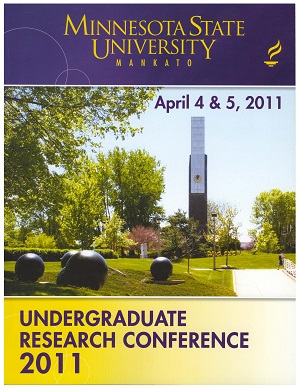Event Title
The Effect of Renal Perfusion Pressure on the Baroreflex Response to High Blood Pressure
Location
CSU 253/4/5
Start Date
4-4-2011 1:30 PM
End Date
4-4-2011 3:00 PM
Student's Major
Biological Sciences
Student's College
Science, Engineering and Technology
Mentor's Name
Penny Knoblich
Mentor's Department
Biological Sciences
Mentor's College
Science, Engineering and Technology
Description
Hypertension, or high blood pressure, affects 28.6% of the United States population, and results in an increased susceptibility to heart attacks, strokes, and aneurysms. Blood pressure is controlled by two mechanisms, a short term mechanism (baroreflex) and a long term mechanism (kidneys). The baroreflex acutely lowers high blood pressure down to the set point (regulation point) by reducing heart rate and blood vessel resistance. The kidneys regulate blood volume. Hypertension develops as a result of a malfunction of both mechanisms. Although both systems malfunction in all forms of hypertension, traditional thinking is that the two systems function completely independently. However, recent research suggests the two may interact. To test for evidence of this interaction, the current study used anesthetized female SHR (hypertensive) and WKY (normal) rats that were given bolus injections of phenylephrine to generate acute hypertensive episodes. With catheters in the brachial artery, femoral artery, and femoral vein, data was collected on heart rate and blood pressure with the administration of each phenylephrine injection. In order to investigate the possibility that the kidneys have a neurological input to the baroreflex, the descending aorta was alternated between restricted and unrestricted states, therefore preventing or allowing renal (kidney) exposure to acutely induced hypertension. If the kidneys interact with baroreflex responses, induced hypertension should be associated with altered magnitudes of heart rate reduction when comparing results during restricted and unrestricted states. Understanding kidney and baroreflex interactions may contribute to a more lucid understanding of hypertension and the development of more effective treatments.
The Effect of Renal Perfusion Pressure on the Baroreflex Response to High Blood Pressure
CSU 253/4/5
Hypertension, or high blood pressure, affects 28.6% of the United States population, and results in an increased susceptibility to heart attacks, strokes, and aneurysms. Blood pressure is controlled by two mechanisms, a short term mechanism (baroreflex) and a long term mechanism (kidneys). The baroreflex acutely lowers high blood pressure down to the set point (regulation point) by reducing heart rate and blood vessel resistance. The kidneys regulate blood volume. Hypertension develops as a result of a malfunction of both mechanisms. Although both systems malfunction in all forms of hypertension, traditional thinking is that the two systems function completely independently. However, recent research suggests the two may interact. To test for evidence of this interaction, the current study used anesthetized female SHR (hypertensive) and WKY (normal) rats that were given bolus injections of phenylephrine to generate acute hypertensive episodes. With catheters in the brachial artery, femoral artery, and femoral vein, data was collected on heart rate and blood pressure with the administration of each phenylephrine injection. In order to investigate the possibility that the kidneys have a neurological input to the baroreflex, the descending aorta was alternated between restricted and unrestricted states, therefore preventing or allowing renal (kidney) exposure to acutely induced hypertension. If the kidneys interact with baroreflex responses, induced hypertension should be associated with altered magnitudes of heart rate reduction when comparing results during restricted and unrestricted states. Understanding kidney and baroreflex interactions may contribute to a more lucid understanding of hypertension and the development of more effective treatments.
Recommended Citation
Kabes, Tyler and Meredith Lovaas. "The Effect of Renal Perfusion Pressure on the Baroreflex Response to High Blood Pressure." Undergraduate Research Symposium, Mankato, MN, April 4, 2011.
https://cornerstone.lib.mnsu.edu/urs/2011/poster-session-C/7



